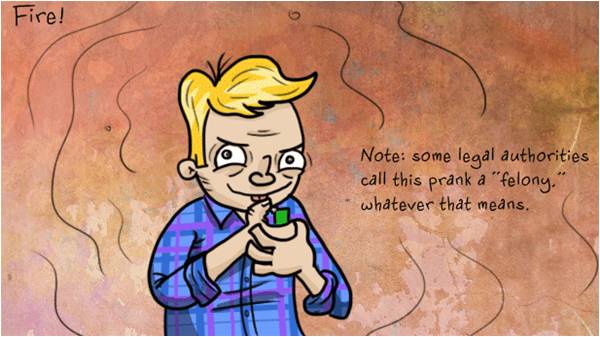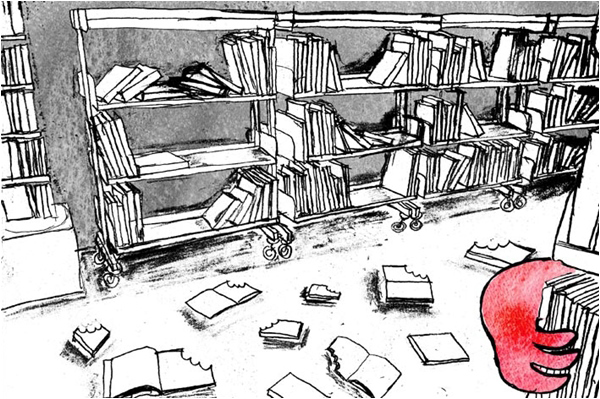
On a bright, cold day in February 1954, the Provost and teacher wardens of the boys’ hostel in Alligarh University were roused at 6 am by the strangled roar of an enraged camel which had mysteriously been deposited on the roof sometime in the night. The confused animal hissed and spat, making a beeline for whoever attempted to approach it. By the following evening, a desperate plea was made from the administration: could the architects of this stunt kindly come forward and help to get the camel back down in the same manner than they’d gotten it up? Of course, no one owned up to the deed. An entire day was sacrificed to Operation Evacuation, and with it all classes and examinations. This strategically executed prank allowed the students a roaring good time at the expense of the hapless teachers who, in the end, had to sedate the camel and have it removed via crane.

This story, narrated several years later by my bright-eyed, eighty year old uncle, made me wonder about his rich educational past that involved a spirit of mischief and fun, and I immediately scrambled to collect more gems from teachers who had seen it all. One of the more amusing stories came from Mr. Angelo Rayer, Dean of St. Patrick’s High School A-level section, who remembers how he summoned a particularly recalcitrant student’s father to discuss his terrible grades. The student, realizing he was in grave trouble, strolled outside, and commissioned a tonga-wala to sit in his father’s stead. The tonga-wala appeared dutifully at the appointed time, listened seriously to Mr. Rayer’s comments and politely thanked him and left. Later, students revealed to the Dean what they had done, much to the enjoyment of the whole school, including Mr. Rayer himself. Practical jokes are an essential part of any educational experience. A successful stunt requires ingenuity, coordination and creativity. It also requires an educated judgment of just how many boundaries may be pushed – which is how one generation learns from and improves upon its predecessors. Very often, it will spark off discussion on respect and disrespect and the boundaries in between – important life lesson that will stay with a student forever. The most useful skill a teacher can teach his or her students is to develop the ability to laugh at themselves – in other words: a healthy sense of humor. Of course, in order to do so, teachers must possess a sense of fun themselves. What strikes me about such coordinated hoaxes of the past was the understanding that a relationship with authority needs must incorporate a certain amount of elbow room where students were allowed to express themselves through tasteful rebellion. Teachers were let in on the joke to reveal that no disrespect was meant. There was a spirit of mischief and fun, combined with a certain irreverence towards life. Hasan Zaidi recounts the saga of the fake O-level result. Every year, as per tradition, the seniors in his school published a sham set of grades – with the cooperation of the administration (who felt that those overly consumed with grades deserved a bit of teasing). When they were displayed, there was much excitement before everyone was informed that the results were fake. Though this was probably an emotional roller coaster in itself, the seniors, with Zaidi, pulled an unexpected double whammy, by presenting a second list of results, elaborately printed with official masthead typefaces for authenticity. When these results were unveiled, there was more hysteria and ecstasy. When these too were revealed to be counterfeit, the first years were naturally close to murder. But the incorrigible A2s weren’t done. In a final twist, when the actual Cambridge results came out a week later, the hapless O levels was informed about yet another hoax –much to the relief of many. Only later, when the administration informed them that their brilliant/terrible results were authentic, did hysteria start again. Cruel? Yes. Funny? Indeed, (though it might have taken the O level students some time to see the humor in the situation). But I can’t quite imagine such a prank being allowed in the current educational climate, where the administration and the school parents would have been up in arms at the entire affair, because grades are considered a matter of life and death.
There has always been a dangerous side to pranks, but, it seems that the light-hearted innocence of the past has receded, giving way to sadistic bullying, where the goal is humiliation and vengeance, and this is directly a result of the fact that the respect and awe commanded by the teachers of the past has diminished. My students tell me about the funniest pranks they’ve played in the past two years: laxatives in the teachers’ tea, Elfi on the teacher’s chair and ink on the teachers’ face; puncturing car tires and scratching the paint on the side of the doors. A build-up of anger, frustration, a feeling of never being heard – all this and more is revealed in the modern culture of pranking which is more violent and less creative.
Which is a shame, because the pranks of school eventually involve to political protests which are the hallmark of any healthy, democratic society. When the authorities don’t listen, you don’t force their hand through violent attack– you launch a protest. The most entertaining example of this, to my mind, was when the students of Karachi University, in response to the apathy of the administration regarding student transportation, announced to the students that the point buses had been upgraded. Everyone was invited everyone to come and have a look. There, on university road, was a long line of donkey-carts with sorry looking mules that seemed to wilt under the scorching heat. Billy Wilder said: “If you are going to tell people the truth, be funny or they will kill you.” School antics allow students space to get their voices heard and their frustrations felt. This must be fostered and cultivated to teach essential lessons in life. In many ways, pranks are more an opportunity than an annoyance, if only we have the wisdom to see them in this light.

This strategically executed prank allowed the students a roaring good time at the expense of the hapless teachers
This story, narrated several years later by my bright-eyed, eighty year old uncle, made me wonder about his rich educational past that involved a spirit of mischief and fun, and I immediately scrambled to collect more gems from teachers who had seen it all. One of the more amusing stories came from Mr. Angelo Rayer, Dean of St. Patrick’s High School A-level section, who remembers how he summoned a particularly recalcitrant student’s father to discuss his terrible grades. The student, realizing he was in grave trouble, strolled outside, and commissioned a tonga-wala to sit in his father’s stead. The tonga-wala appeared dutifully at the appointed time, listened seriously to Mr. Rayer’s comments and politely thanked him and left. Later, students revealed to the Dean what they had done, much to the enjoyment of the whole school, including Mr. Rayer himself. Practical jokes are an essential part of any educational experience. A successful stunt requires ingenuity, coordination and creativity. It also requires an educated judgment of just how many boundaries may be pushed – which is how one generation learns from and improves upon its predecessors. Very often, it will spark off discussion on respect and disrespect and the boundaries in between – important life lesson that will stay with a student forever. The most useful skill a teacher can teach his or her students is to develop the ability to laugh at themselves – in other words: a healthy sense of humor. Of course, in order to do so, teachers must possess a sense of fun themselves. What strikes me about such coordinated hoaxes of the past was the understanding that a relationship with authority needs must incorporate a certain amount of elbow room where students were allowed to express themselves through tasteful rebellion. Teachers were let in on the joke to reveal that no disrespect was meant. There was a spirit of mischief and fun, combined with a certain irreverence towards life. Hasan Zaidi recounts the saga of the fake O-level result. Every year, as per tradition, the seniors in his school published a sham set of grades – with the cooperation of the administration (who felt that those overly consumed with grades deserved a bit of teasing). When they were displayed, there was much excitement before everyone was informed that the results were fake. Though this was probably an emotional roller coaster in itself, the seniors, with Zaidi, pulled an unexpected double whammy, by presenting a second list of results, elaborately printed with official masthead typefaces for authenticity. When these results were unveiled, there was more hysteria and ecstasy. When these too were revealed to be counterfeit, the first years were naturally close to murder. But the incorrigible A2s weren’t done. In a final twist, when the actual Cambridge results came out a week later, the hapless O levels was informed about yet another hoax –much to the relief of many. Only later, when the administration informed them that their brilliant/terrible results were authentic, did hysteria start again. Cruel? Yes. Funny? Indeed, (though it might have taken the O level students some time to see the humor in the situation). But I can’t quite imagine such a prank being allowed in the current educational climate, where the administration and the school parents would have been up in arms at the entire affair, because grades are considered a matter of life and death.
There has always been a dangerous side to pranks, but, it seems that the light-hearted innocence of the past has receded, giving way to sadistic bullying, where the goal is humiliation and vengeance, and this is directly a result of the fact that the respect and awe commanded by the teachers of the past has diminished. My students tell me about the funniest pranks they’ve played in the past two years: laxatives in the teachers’ tea, Elfi on the teacher’s chair and ink on the teachers’ face; puncturing car tires and scratching the paint on the side of the doors. A build-up of anger, frustration, a feeling of never being heard – all this and more is revealed in the modern culture of pranking which is more violent and less creative.

When the authorities don't listen, you don't force their hand through violent attack
Which is a shame, because the pranks of school eventually involve to political protests which are the hallmark of any healthy, democratic society. When the authorities don’t listen, you don’t force their hand through violent attack– you launch a protest. The most entertaining example of this, to my mind, was when the students of Karachi University, in response to the apathy of the administration regarding student transportation, announced to the students that the point buses had been upgraded. Everyone was invited everyone to come and have a look. There, on university road, was a long line of donkey-carts with sorry looking mules that seemed to wilt under the scorching heat. Billy Wilder said: “If you are going to tell people the truth, be funny or they will kill you.” School antics allow students space to get their voices heard and their frustrations felt. This must be fostered and cultivated to teach essential lessons in life. In many ways, pranks are more an opportunity than an annoyance, if only we have the wisdom to see them in this light.

